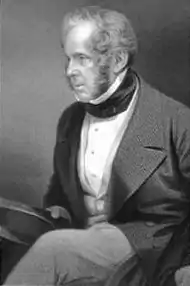Liberal government, 1859–1866
The Liberal government of the United Kingdom of Great Britain and Ireland that began in 1859 and ended in 1866 consisted of two ministries: the second Palmerston ministry and the second Russell ministry.
Lord Palmerston led the Government until his death from 1859–1865 and was succeeded by Lord Russell.
Russell led the Government after Palmerston died in 1865. His government was replaced in 1866.
History
After the fall of the second of Lord Derby's short-lived attempts at governments in 1859, Palmerston returned to power, this time in alliance with his former rival, the Earl Russell, in what is regarded as the first Liberal government. Palmerston remained as Prime Minister until his death in 1865, when Russell succeeded him. However, disunity within the party caused the fall of the government in the following year, and Lord Derby formed another Conservative ministry.
Cabinets
The Viscount Palmerston's Cabinet, June 1859 – October 1865
- Lord Palmerston – First Lord of the Treasury and Leader of the House of Commons
- Lord Campbell – Lord Chancellor
- Lord Granville – Lord President of the Council and Leader of the House of Lords
- The Duke of Argyll – Lord Privy Seal
- Sir George Cornewall Lewis – Secretary of State for the Home Department
- Lord John Russell – Secretary of State for Foreign Affairs
- The Duke of Newcastle – Secretary of State for the Colonies
- Sidney Herbert – Secretary of State for War
- Sir Charles Wood – Secretary of State for India
- The Duke of Somerset – First Lord of the Admiralty
- William Ewart Gladstone – Chancellor of the Exchequer
- Edward Cardwell – Chief Secretary for Ireland
- Thomas Milner Gibson – President of the Board of Trade and of the Poor Law Board
- Sir George Grey – Chancellor of the Duchy of Lancaster
- Lord Elgin – Postmaster-General
Changes
- July 1859 – Charles Pelham Villiers succeeds Milner-Gibson as President of the Poor Law Board (Milner-Gibson remains at the Board of Trade)
- May 1860 – Lord Stanley of Alderley succeeds Lord Elgin as Postmaster-General
- June 1861 – Lord Westbury succeeds Lord Campbell as Lord Chancellor
- July 1861 – Sir George Cornewall Lewis succeeds Herbert as Secretary for War. Sir George Grey succeeds Lewis as Home Secretary. Edward Cardwell succeeds Grey as Chancellor of the Duchy of Lancaster. Cardwell's successor as Chief Secretary for Ireland is not in the Cabinet.
- April 1863 – Lord de Grey becomes Secretary for War following Sir George Lewis's death.
- April 1864 – Edward Cardwell succeeds the Duke of Newcastle as Colonial Secretary. Lord Clarendon succeeds Cardwell as Chancellor of the Duchy of Lancaster.
- July 1865 – Lord Cranworth succeeds Lord Westbury as Lord Chancellor
The Earl Russell's Cabinet, October 1865 – June 1866
Changes
- February 1866: The Lord de Grey succeeds Sir Charles Wood as Secretary for India. Lord Hartington succeeds Grey as Secretary for War.
List of ministers
Cabinet members are listed in bold face.
- Notes
- Also Leader of the House of Commons.
- Also Leader of the House of Lords 29 October 1865 – 26 June 1866.
- Also Leader of the House of Commons 1865–1866.
- Also Leader of the House of Lords 18 June 1859 – 29 October 1865.
- Created Earl Russell on 30 July 1861.
- Created Baron Herbert of Lea on 15 January 1861.
- Knight Commander of the Order of the Bath from 27 November 1865.
- Permanent.
References
- C. Cook and B. Keith, British Historical Facts 1830–1900
- The post had been vacant. John Prest, Lord John Russell (University of South Carolina Press, 1972), 431.
This article is issued from Wikipedia. The text is licensed under Creative Commons - Attribution - Sharealike. Additional terms may apply for the media files.


_(2022).svg.png.webp)